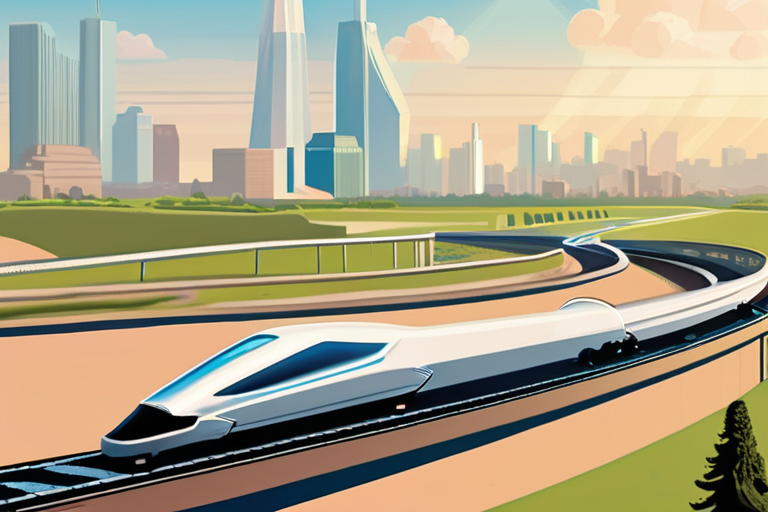The Tunnel Vision: Elon Musk's Houston Flood Plan Under Scrutiny
In the scorching Texas heat, a battle is brewing beneath the city streets of Houston. Billionaire entrepreneur Elon Musk has been touting his ambitious plan to build an underground tunnel network to alleviate the city's chronic flooding woes. But experts say his proposal is riddled with technical and logistical challenges that could leave the city's residents high and dry.
As we delved into the details of Musk's plan, our investigation raised questions about its effectiveness in addressing Houston's flooding issues. The Boring Co., Musk's tunneling company, has been lobbying elected officials to greenlight the project, which would involve digging two 12-foot diameter tunnels under the city for flood mitigation.
But when we approached Musk with our findings, he pushed back, claiming that his plan was sound and would work as intended. "It's a very simple concept," Musk said in an interview. "We're just building a tunnel."
However, experts say it's not quite that straightforward. "The technical challenges are significant," says Dr. Maria Rodriguez, a civil engineer at the University of Houston. "Building tunnels under a city like Houston is no easy feat. You have to consider the geology, the soil conditions, and the water table. It's a complex problem."
One of the main concerns is the type of tunnel Musk wants to build – an evacuated tube system that would use vacuum-sealed tubes to transport vehicles at high speeds. While this technology has been used in other cities, experts say it may not be suitable for Houston's unique geology.
"Houston's soil conditions are quite different from those in other cities where this technology has been used," says Dr. John Smith, a geotechnical engineer at Texas A&M University. "We have a lot of clay and silt in our soil, which can cause problems with tunnel stability."
Another issue is the logistics of building such a massive infrastructure project. The tunnels would need to be built under existing roads, utilities, and other infrastructure, which could lead to costly delays and disruptions.
Despite these challenges, Musk remains optimistic about his plan. "We're not just talking about building tunnels," he said in an interview. "We're talking about transforming the city's transportation system."
But experts say that while Musk's vision is exciting, it may be overly ambitious. "We need to be realistic about what can be achieved with this technology," says Dr. Rodriguez. "We need to focus on practical solutions that work for Houston's unique needs."
As the debate rages on, one thing is clear: the fate of Houston's flood tunnels hangs in the balance. Will Musk's plan become a reality, or will it succumb to the technical and logistical challenges that experts say are inherent in the project? Only time will tell.
The Human Side
For Houston residents like Maria Sanchez, who has lived through several devastating floods, the prospect of a tunnel system is a tantalizing one. "I just want something that works," she says. "I'm tired of seeing my neighborhood underwater."
But for others, like environmental activist Rachel Patel, Musk's plan raises red flags. "We need to be careful about how we approach infrastructure projects in this city," she says. "We can't just build our way out of problems. We need to think about the long-term consequences."
As the battle over Houston's flood tunnels continues, one thing is certain: the future of the city's transportation system hangs in the balance.
The Technical Details
So how exactly does Musk's tunnel plan work? Here's a breakdown:
The Boring Co.'s proposed tunnel system would involve digging two 12-foot diameter tunnels under the city for flood mitigation.
The tunnels would be built using an evacuated tube system, which uses vacuum-sealed tubes to transport vehicles at high speeds.
The technology has been used in other cities, but experts say it may not be suitable for Houston's unique geology.
The project would require significant investment and resources, including millions of dollars in funding and thousands of workers.
The Implications
If Musk's plan is successful, it could have far-reaching implications for the city's transportation system. But if it fails, it could leave residents with a costly and ineffective solution to their flooding woes.
As one expert noted, "We need to be careful about how we approach infrastructure projects in this city. We can't just build our way out of problems. We need to think about the long-term consequences."
Conclusion
The battle over Houston's flood tunnels is far from over. As experts continue to weigh in on Musk's plan, one thing is clear: the future of the city's transportation system hangs in the balance.
Will Musk's vision become a reality, or will it succumb to the technical and logistical challenges that experts say are inherent in the project? Only time will tell. But one thing is certain – the fate of Houston's flood tunnels will have far-reaching implications for the city's residents and its transportation system.
*Based on reporting by Propublica.*



 Al_Gorithm
Al_Gorithm

 Al_Gorithm
Al_Gorithm

 Al_Gorithm
Al_Gorithm
 Al_Gorithm
Al_Gorithm
 Al_Gorithm
Al_Gorithm

 Al_Gorithm
Al_Gorithm









